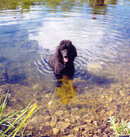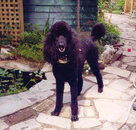First, I'd like to thank all of you who sent your good wishes and good vibes for my Big Boy Marley. It was a big help knowing folks were thinking of him.
The short story is, he passed peacefully back home on Friday, Oct 3. I've been resisting posting about it, it's pretty raw. But maybe it will help somebody in my position in the future. All his life he'd been healthy, robust, solid. Sweet tempered, smart, social. Nothing amiss.
The long story is, about three weeks ago he slipped on a tile floor and fell on his right shoulder. Myself, a friend, and the vet who makes house calls thought it was a strain. Well, after 2 weeks (right after I got back from Phoenix) he was not better, but worse, limping. Still, he had his appetite, interests and good humour, hobbled along for his walks, tried to keep up with his brother Rodel (9 years old Black Standard Poodle, not really related, just what I called them).
On Thursday Oct 2 he collapsed, fell right off the couch like a ton of bricks. He didn't move, and I thought he'd broken something. I scooped up him and the rug he fell on (he weighed 65 pounds) and transported him 20 minutes to the local vet clinic. There, it was obvious he was going into shock. If you've ever had to question whether a dog's gums have gone pale due to shock, and you're not sure, it's not shock. He had dark pigmentation on most of his gums and lips (being a black dog) but the parts that should have been pink were white. He couldn't stand up. The local vet (after much palpation) thought there were no obvious broken bones, there were multiple possible causes for shock and collapse, and that the best place for him was Ontario Veterinary College in Guelph, where they have lots of resources. If I'd had him x-rayed or tested at the local clinic, they'd likely repeat those tests at OVC. So since it's just 20 minutes away, I drove him there. He was put in the Small Animal ICU (they have these things?)
At OVC, they did ultrasound, abdominal x-ray and blood work. It could have been osteosarcoma (bone cancer) or hemangiosarcoma (blood vessel cancer). If it was osteosarcoma, the treatment would have been amputation of his leg, since the tumour was at his shoulderblade. If it was hemangiosarcoma, the "heroic" treatment would be tumour excision, and if he survived, chemo/radiation. To determine what choice to make, they had to stabilize him - he was bleeding into the space between his skin and his ribs. Once (and if) he stabilized, they'd need to do more x-rays to see if the tumour was going into the chest wall....it just got worse and worse.
That's when I asked you all for your thoughts. The next morning, I was told he'd had three blood transfusions and two plasma transfusions. (Who knew that people bring their dogs to be blood donors??!!! And they do at OVC.) The x-ray showed it was angiosarcoma. They'd never seen an angiosacoma outside the abdominal cavity, so this was a learning moment at this great teaching hospital. The bleeding hadn't stopped, it was like pouring water in one end of a hose and it coming out the other end. Pressure bandages were being used. I told the attending vet that what I wanted was to bring him home, where my travelling vet could give him the injection, instead of him dying there with all the noise and weird smells and animal fear. The vet said she thought that was the most humane thing that could be done. So, they topped up his pain meds, and I drove him home. He totally relaxed when he was carried into the house. My vet came over, and with friends and his brother all around, he just passed on with grace and dignity.
The learning part for me was being told that angiosarcoma was common in large, "older" dogs. Really, since when? I remember many large dogs living to be 12, 14, 16 years old. When did angiosarcoma become commonplace? When was an older dog 10, not 15?
The other learning part was that this kind of cancer is aggressive. As in, less that a couple of weeks' time. The cancer can be in multiple sites, so excising one tumour means nothing, there may be dozens more waiting to bleed out. The vets told me that an older dog might go lame, have a muscle strain, or seem arthritic, and you think nothing of it. If it doesn't get better in 2 weeks, something's wrong.
Thanks for reading all this. Marley's brother Rodel and I are adapting to this change. But it's just guttingly painful. I guess sudden is better than lingering, but it freaking sucks.






